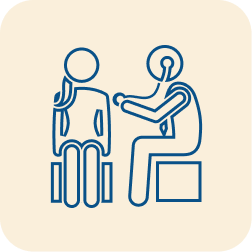Understanding the intricate connection between mental and physical health is essential for caregivers, as the well-being of one often directly affects the other. For caregivers, maintaining their well-being involves recognizing this connection and taking proactive steps to manage both mental and physical health. What’s going on in your mind can impact how you feel physically and vice versa.
You can learn more about this mind-body connection here.
A caregiver’s physical health can be affected by several key factors. The demands of caregiving often lead to significant physical impacts. Older caregivers might face more health challenges and experience greater physical strain.
The type of care provided also plays a role-some caregiving tasks are more physically demanding than others. If caregiving continues for a long time and you are the only caregiver, it can result in increased physical strain.
Moreover, lower income and limited access to healthcare can exacerbate these challenges, making it more difficult for caregivers to manage their health and stress effectively.
Physical strain can lead to a caregiver experiencing chronic pain, such as headaches, backaches, or muscle aches, as well as frequent illnesses, increased blood pressure, and digestive issues like stomach aches or nausea.
It may also worsen pre-existing conditions. Physical stress can equally impact a person’s mental health, which may be visible through changes in one’s eating habits, sleep disturbances, low mood, anxiety, overthinking or biased negative perception, irritability, and more.
As a caregiver, you often prioritise others’ needs over your own, leading to irregular or missed meals. This can leave you feeling drained and low on energy. To keep yourself in good health and shape and try to prioritize balanced and regular meals. They’re important for your health and help you stay energised throughout the day. Read more about this here.

For caregivers, mindful eating can promote a calm state of mind, improve energy levels, enhance focus and patience, and contribute to overall well-being amidst a demanding schedule.
Consistent and restful sleep can be a challenge for caregivers. With so many responsibilities, it’s common to experience fatigue and disrupted sleep, affecting your overall health and focus.

Understand more about how sleep can impact your health and find some useful tools that will help you sleep better, here.
Regular physical activity is key to maintaining overall health and well-being. It builds strength and endurance, helping you manage daily tasks more efficiently. Exercise also boosts mental health by releasing endorphins, which reduce stress and anxiety, improve sleep, and enhance mood and energy levels. Incorporating exercise into your routine improves physical fitness and supports a balanced mental state, making it an essential part of a healthy lifestyle.

Specific: Choose an activity you enjoy, such as brisk walking, yoga, or cycling, and decide when and where you will do it. For example, “I will walk in the park near my home in the morning.”

Measurable: Set clear goals to track progress, like “I will walk for 20 minutes, at least three times a week, and mark the days I walk, on my calendar.”

Achievable: Make sure that your goal is realistic, given your current schedule and strength, and create a practical plan to make it attainable. Eg: “Since my care-recipient doesn’t wake up before 9 a.m., I can use the morning to go to the park for a walk.”

Relevant: Ensure your goals align with your values, priorities, and needs and connect them to your larger purpose. “Engaging in physical activity will help me stay fit, which in turn allows me to take better care of myself and my loved one.”

Time-Bound: Define when you would like to start working to achieve your goals. Setting a timeline to assess progress and make adjustments to modify your goal. “I will start walking on Monday and mark the days I complete my walks. After 30 days, I will review my calendar to assess if I’ve achieved walking at least three times a week.”
SMART goals technique ensures your exercise plan is clear, manageable, and aligned with your health and caregiving needs, helping you stay motivated and consistent

Alcohol and tobacco consumption can have significant effects on your physical health and overall well-being. Alcohol can lead to various health-related risks, including different types of cancer, stroke, and heart disease. Additionally, smoking produces second-hand smoke, which those around you can inhale.
It is important to note that there is no safe level of tobacco smoke inhalation.

In addition to maintaining a balanced diet, exercising regularly, and managing stress, regular check-ups with your doctor help catch issues early and keep you in great shape.
Prioritising your health means you’ll be better equipped to support those you care about.
Your well-being matters! Taking care of yourself is essential for being able to care for others.
Caregiving can have a profound impact on mental health. The demands of providing care and the emotional weight of supporting a loved one can strain your well-being. We have tried to address the emotions that may arise through this journey and exercises that may help you cope.
Disclaimer: These activities can help manage your emotions. However, they may not be effective for everyone or in all situations. If you find that these techniques are not working for you, or if you are experiencing significant emotional or psychological difficulties, it’s important to seek personalised support and guidance from a mental health professional.
Caregivers often experience significant stress from the relentless demands of their role, be it concerns about their loved one’s health, the challenges of managing medical appointments, the fear of making wrong decisions, or financial pressures related to medical costs and personal expenses. While stress during the caregiving journey is natural and expected, prolonged and unresolved stress can escalate into anxiety impacting the daily routine or lifestyle.
Over time, this unresolved and pent-up stress can lead to excessive worry about future challenges, such as worsening health conditions, financial insecurity, or one’s ability to cope. An anxious caregiver may experience a constant sense of dread, even when no immediate stressor is present. Repeated loss of control during unexpected emergencies can further heighten this stress, resulting in a sense of helplessness and generalized worry about their capacity to manage future situations. This is often compounded by guilt, as caregivers may feel they are not doing “enough.” Over time, such guilt can lead to ruminative thoughts, such as constantly second-guessing decisions or fearing they are failing their loved ones.

There are many ways that an individual could cope with anxiety, like practising mindfulness, engaging in physical activity, journaling, talking to a supportive friend, or seeking therapy from a trained professional. Amongst these, relaxation techniques are often highly effective.
Relaxation techniques help reduce anxiety by calming the nervous system and counteracting the body’s stress response. Relaxation allows the body to enter a state of rest, reducing physical symptoms of anxiety and promoting emotional regulation. They lower heart rate, ease muscle tension, and promote deep breathing, which helps break the cycle of worry and rumination. Regular practice increases resilience to stress, improves sleep, and fosters a sense of control over anxiety.

There are many ways that an individual could cope with anxiety, like practising mindfulness, engaging in physical activity, journaling, talking to a supportive friend, or seeking therapy from a trained professional. Amongst these, relaxation techniques are often highly effective.
Relaxation techniques help reduce anxiety by calming the nervous system and counteracting the body’s stress response. Relaxation allows the body to enter a state of rest, reducing physical symptoms of anxiety and promoting emotional regulation. They lower heart rate, ease muscle tension, and promote deep breathing, which helps break the cycle of worry and rumination. Regular practice increases resilience to stress, improves sleep, and fosters a sense of control over anxiety.
As a caregiver, you may often find yourself weighed down by thoughts of “shoulds” and “what ifs”, making it difficult to take time for yourself without feeling like you’re neglecting your loved one. Many caregivers experience guilt, often believing they are not meeting their own or others’ expectations.

This guilt can weigh heavily and add to emotional stress.

Self-compassion is the practice of treating yourself with the same kindness and understanding that you would offer to a loved one during times of struggle. It encourages a healthier mindset, enabling you to learn from mistakes without spiraling into guilt. This approach ultimately supports overall well-being and fosters personal growth. For more on how to practice self-compassion and care, check out this helpful resource: Be Compassionate Towards Yourself.
Grief is a natural and complex emotional response to loss. Grief for caregivers is a profound and multifaceted experience that often extends beyond the immediate changes in a loved one’s health. The experience of grief can involve the grief of losing personal time, independence, and sometimes even a sense of identity. Caregivers may lose out on their financial and emotional security and also experience a loss of social connections, leading to feelings of isolation.
Grief is a natural and complex emotional response to loss. Grief for caregivers is a profound and multifaceted experience that often extends beyond the immediate changes in a loved one’s health. The experience of grief can involve the grief of losing personal time, independence, and sometimes even a sense of identity. Caregivers may lose out on their financial and emotional security and also experience a loss of social connections, leading to feelings of isolation. Caregivers may mourn the loss of their future goals or dreams, as caregiving demands shift their priorities and alter their plans. These losses, though less tangible than death, can feel just as overwhelming. Navigating this complex grief requires recognition that it is not just the loved one’s health that has changed, but the caregiver’s world as well. Grief is deeply personal and can evoke various feelings.
An individual may experience one or many of the emotions listed below, which can arise from various causes of loss or hardship. These emotions may include:
These emotions can vary significantly from person to person and may shift over time as individuals process their experiences. It’s important to acknowledge these feelings as part of the natural healing process.
Grief is a process or journey that takes time. While it’s commonly believed that there are distinct stages of grief (such as Elisabeth Kübler-Ross’ five stages-denial, anger, bargaining, depression, and acceptance), grief is unique to each individual. Some people experience all stages; others may not go through them in a specific order or may experience different emotions entirely. It’s important to understand that there is no “right” or “wrong” way to grieve.

Seeking support through counselling or support groups can be crucial in navigating this difficult journey. Please remember that you’re not alone.
Feelings of hopelessness and helplessness are common for caregivers, especially when their efforts seem ineffective or progress is slow, which can drain their motivation. When caregivers start to believe they can’t make a positive impact or control their situation, they also begin to struggle with stress and frustration. These heavy emotions fall under the umbrella of depressive symptoms.
Note:While these emotions may signify depression, this is not a diagnosis of any kind. Depression can only be diagnosed by a healthcare professional. People can experience depression symptoms without having a diagnosed disorder.
Seeking help is a sign of strength, not weakness. Reaching out for support-whether from a friend, family member, or professional-can make a difference.
One can often feel angry or resentful when they perceive that their efforts in caregiving go unappreciated or when they’re overwhelmed by the demands of the role, like the stress of dealing with complex medical issues, navigating bureaucratic systems, or facing financial strain. These feelings can weigh heavily and add to emotional stress.


All emotions are real, but they are not permanent. This moment will pass.
Feel free to contact a counsellor via our Helpline if at any stage, you feel like you need extra support to manage your thoughts or emotions. Our Helpline number is 8686 139139. It is open all days of the week from 9am to 8pm. You can also email us at [email protected]
The Mann Talks Helpline employs trained mental health professionals who offer an empathetic and non-judgemental environment where you can share your thoughts, emotions and experiences freely. The conversation will be confidential, and your privacy will be respected at all times.
Calling the Mann Talks helpline offers:
We are an inclusive platform and encourage individuals from across experiences, backgrounds and abilities to use the services available. We do not discriminate on any grounds, whatsoever.
A common misconception is that a helpline should only be used in moments of crisis. You can reach out to Mann Talks any time you are feeling emotionally distressed.
We often feel guilty about reaching out to friends and family constantly. We fear their judgement, or we may not want to share sensitive information with those close to us. At Mann Talks, you will get to speak to a trained mental health professional who will provide you with an unbiased, safe and confidential space where you can comfortably share your thoughts, emotions and experiences.
Sometimes, a loved one may be going through a tough time and you may not know how to help them. You can reach out to Mann Talks on behalf of your loved one to find out how to support them and minimize the emotional distress they are going through.
When you call the helpline, the mental health professional that you speak to will be respectful, emotionally supportive, non-judgmental and listen to you patiently.
At Mann Talks, we consider privacy and confidentiality to be of utmost importance. We prioritize our callers' privacy so that their identity, respect and dignity are uncompromised.
All conversations between the caller and our mental health professionals will remain confidential unless there is danger to the callers or others.
All conversations between the caller and our mental health professionals will remain confidential unless there is danger to the caller or others.The trained mental health professionals speak in Hindi, Marathi, Punjabi, Bengali and English. The Helpline is active from Mon-Sun, 9 a.m. to 6 p.m.
While talking to a friend or family member may be comforting, there is a risk that they might bring their own biases and judgements to the conversation. There may also be things that we don’t want our loved ones to know—thoughts and emotions that cause us anxiety, guilt or shame; or painful emotions that they might not be able to handle.
The mental health professionals at Mann Talks are trained in the art of listening and offer a safe space without any bias or judgement. This will allow you to speak more freely than you would with someone you know. They are also trained to be able to understand your pain and situation, and help you resolve your issues.
At Mann Talks, we prioritize confidentiality, dignity and respect of the caller. Our mental health professionals will not share anything you discuss with anyone else. The only time confidentiality may be broken is if the mental health professional feels you might harm yourself, or those around you.
In any other circumstance, what you share remains confidential.
It is important to feel comfortable with the mental health professional you’re accessing treatment from. If you feel like the professional you’ve been assigned/are speaking to isn’t a good fit for you, it’s okay to request a different one.
Don’t feel pressured to continue to talk to a professional you don’t like—after all, Mann Talks is for your wellbeing, and your comfort comes first.










